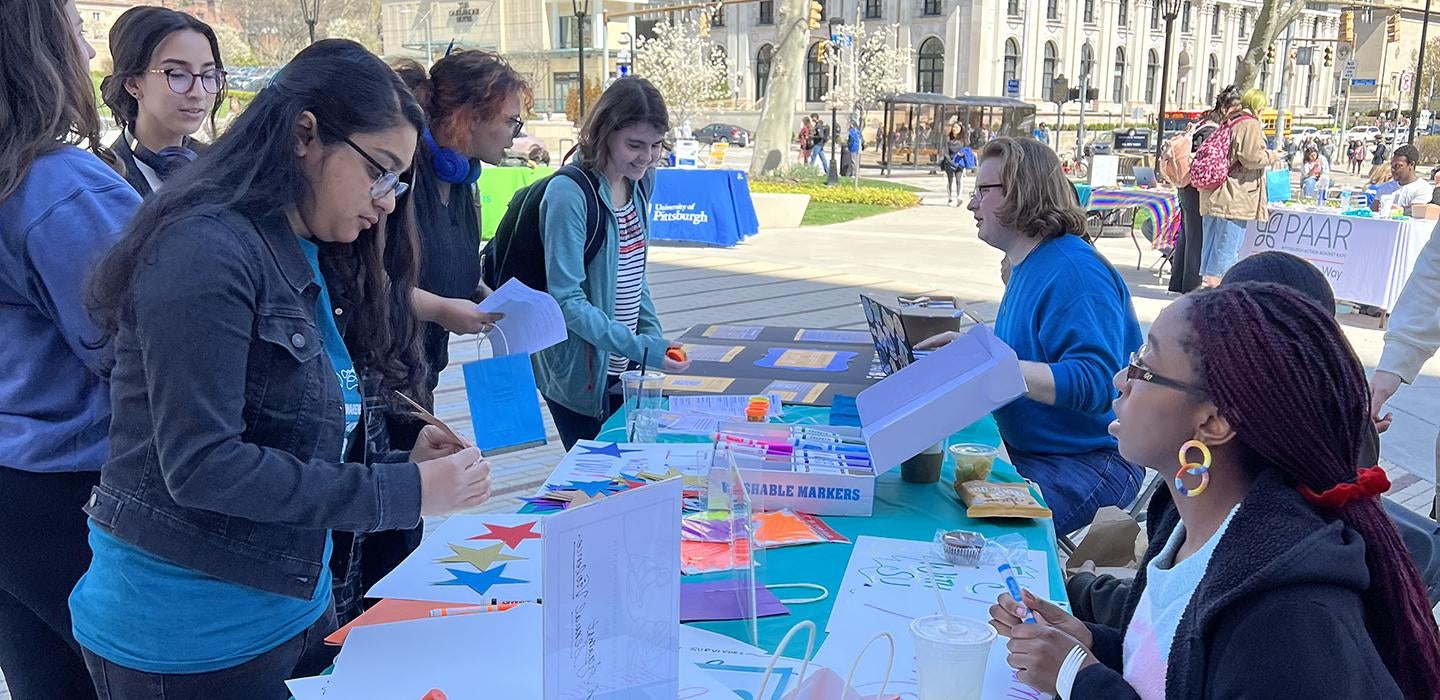
Subscribe to Pittwire Today
Get the most interesting and important stories from the University of Pittsburgh.Five of Pittsburgh’s universities will come together April 16 to walk through the Oakland neighborhood to raise awareness of sexual assault.
The Pittsburgh Universities Believe Survivors March will begin at 11:45 a.m. at Carlow University on Fifth Avenue and proceed through Oakland to the University of Pittsburgh’s Posvar Hall.
There, on the patio, survivors of sexual assault will tell stories and share resources, said Carrie Benson, senior manager for prevention and education in the University of Pittsburgh’s Title IX Office. In addition to Carlow and Pitt, students, faculty, staff and alumni from Chatham, Carnegie Mellon and Duquesne universities also will participate.
Walkers are encouraged to wear teal clothing. Students plan to gather at Carlow before the beginning of the march to make signs and banners to carry as they walk, Benson said.
“This march grew out of the student-identified need to amplify the voices of survivors, to challenge victim-blaming and to demonstrate support for students who are harmed by domestic and sexual violence,” said Erin Tunney, director of Project Safe at Carlow University. “This march is designed to promote an understanding of gender-based violence as a problem on campuses and to call upon all members of our campuses to change cultural norms that enable this violence.”
Sexual Assault Awareness Month was established in 2001 by the National Sexual Violence Resource Center (NSVRC), which itself has its roots in Pennsylvania. The center was initially established by the Pennsylvania Coalition Against Rape and the U.S. Centers for Disease Control and Prevention.
This year’s national theme for the commemoration is “Drawing Connections: Prevention Demands Equity.” A spokesperson for the NSVRC says the theme calls on all individuals, communities, organizations and institutions to “change ourselves and the systems surrounding us to build racial equity and respect.”
“It’s always important to support and believe survivors, and we’re excited to see students from different universities unite together to share the message that April is a time to be outspoken in our community of survivors and allies,” said Emma Schneck, an anthropology and molecular biology major in Pitt’s Frederick Honors College, minoring in chemistry and gender, sexuality and women’s studies.
Colleges and universities are particularly concerned about preventing sexual violence, with almost 1 out of 4 undergraduate women at America’s largest universities reporting that they have experienced sexual assault or misconduct, according to the NSVRC. Roughly 40% to 50% of victims are attacked by someone they considered a friend or intimate partner.
“Unfortunately, sexual violence does not discriminate — it has a widespread impact on our communities,” said Alicia Simpson, Title IX coordinator and director of sexual misconduct prevention and response at Duquesne University. “I hope that not only survivors, but also allies such as friends, family, employees and students from Pittsburgh universities join together to show our support and awareness of this important cause.”
Holding a joint event such as the April 16 walk helps to raise awareness of sexual assault prevention by showing the community’s shared commitment to preventing it, said Ryan Wilpula, assistant director of education and outreach in the Office for Institutional Equity and Title IX at Carnegie Mellon University. Events such as the Pittsburgh Universities Believe Survivors March also build a sense of community and solidarity between those working to prevent sexual assault and those who are living with its impacts, he said.
“Survivors can sometimes struggle with feelings of shame, guilt, isolation or may even worry that people won’t believe them,” Wilpula said. “By holding events such as these, our campus community can acknowledge experiences of survivors, and we can offer them our support.”
Simpson said the city’s major universities are working together to create a network of support that “resonates through the Pittsburgh community” and beyond their campus borders.
“An event like this shows solidarity in our local campus communities — that sexual assault will not be tolerated, and that we continue to stand and work together to ensure the safety of our students, faculty and staff,” she said.
More University of Pittsburgh Sexual Assault Awareness Month events can be found at https://pitt.ly/SAAM2023. On social media, the hashtag for the month is #BelieveSurvivors.
— Jason Togyer, photography by Carrie Benson


